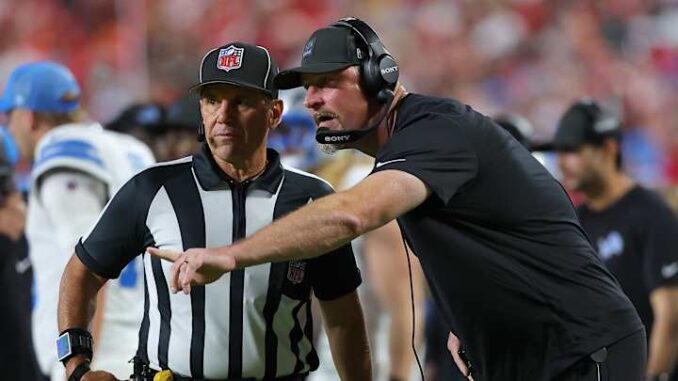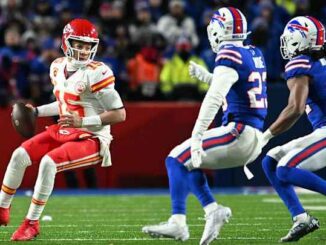
After the Detroit Lions’ 30–17 loss to the Kansas City Chiefs on Sunday night, a controversial first-quarter penalty wiped a touchdown off the board, and now, things are getting messy.
Head coach Dan Campbell insists he was told by an on-field official that the call came from New York, referring to the NFL’s officiating command center. That would be a serious issue because the play in question, an illegal motion penalty on Jared Goff during a trick play, is not reviewable under NFL rules.
But referee Craig Wrolstad told reporters the exact opposite.
In his official PFWA pool report, Wrolstad claimed, “We did not have any assistance from Kansas City or New York.”
So which is it? Because somebody isn’t telling the truth.
Pool report on the Jared Goff TD penalty pic.twitter.com/DKrJX2yHCR
— Dave Birkett (@davebirkett) October 13, 2025
What Happened on the Play
Early in the first quarter, the Lions ran what looked like another gem from offensive coordinator John Morton, a creative misdirection play designed to catch Kansas City off guard.
Goff walked toward the line of scrimmage, paused briefly as if under center, then went in motion. Running back David Montgomery took the snap and threw it back to Goff for what appeared to be a touchdown.
Ford Field erupted. But then came the confusion.
There was no flag on the field during the play. In fact, nearly 90 seconds passed before the officials finally threw one, wiping away the score and ruling Goff guilty of illegal motion.
The Rule and the Controversy
The NFL rulebook, specifically Rule 7, Section 4, Article 2, Item 3, states that a T-formation quarterback may go in motion if he comes to a complete stop for at least one full second before the snap.
Wrolstad explained afterward that his crew was trying to determine whether Goff had stopped twice: once when he walked up like a quarterback and again before going in motion.
“There was a little bit of confusion in our discussion whether he had stopped initially or whether he had stopped at the end,” Wrolstad said. “That’s why the flag came in so late.”
But here’s where things get tricky: Campbell says one of the officials told him directly that New York called in during that delay to provide direction.
That is not allowed. NFL referees can receive assistance from the command center only on reviewable plays, such as turnovers, scoring plays, or clock issues. Illegal motion doesn’t qualify.
The Lions’ Response
Campbell, visibly frustrated after the game, said the Lions sent the footage of the play to the league office for review. He couldn’t reveal what the NFL told Detroit in response but made it clear something wasn’t right.
On Wednesday, Campbell joined the Costa and Jansen Show on 97.1 the Ticket, and he doubled down on his insistence that he was told by an NFL official on the field that New York initiated the review.
— DetroitSportsNation (@detsportsnation) October 15, 2025
The head coach isn’t one to throw around accusations lightly. Campbell’s credibility with players, fans, and media is rock solid.
So if his version of events is true, and Wrolstad’s report denies outside involvement, the league has some explaining to do.
A Timeline That Makes No Sense
Let’s break this down:
▪︎ Play happens. Goff scores on a trick play.
▪︎ No flag. Officials huddle for well over a minute.
▪︎ Flag finally flies. Touchdown erased.
▪︎ Referee says confusion among crew delayed the call.
▪︎ Dan Campbell says an official told him the call came from New York.
If Wrolstad’s crew was simply debating among themselves, as he claimed, why did the discussion take nearly 90 seconds? And why would an official on the field tell Campbell otherwise?
Even more puzzling: this wasn’t a borderline call. Either Goff stopped long enough, or he didn’t. The extended delay doesn’t fit the explanation.
The NFL’s Integrity Question
If Campbell is correct, and the command center in New York influenced the call, that would represent a violation of league policy and potentially compromise the integrity of the officiating process.
The league has faced scrutiny for years over inconsistency in officiating, but rarely does a situation arise where a head coach and a referee’s official statement directly contradict each other.
Fans have seen plenty of questionable flags, but this one feels different. It’s not about judgment, it’s about honesty.
The Bottom Line
Dan Campbell says the call came from New York. Craig Wrolstad says it didn’t. Somebody is lying.
And until the NFL publicly clarifies what actually happened during that chaotic first-quarter sequence, the controversy will only grow.
The Lions lost a touchdown, and maybe something bigger, a little more trust in how this league polices itself.


Be the first to comment